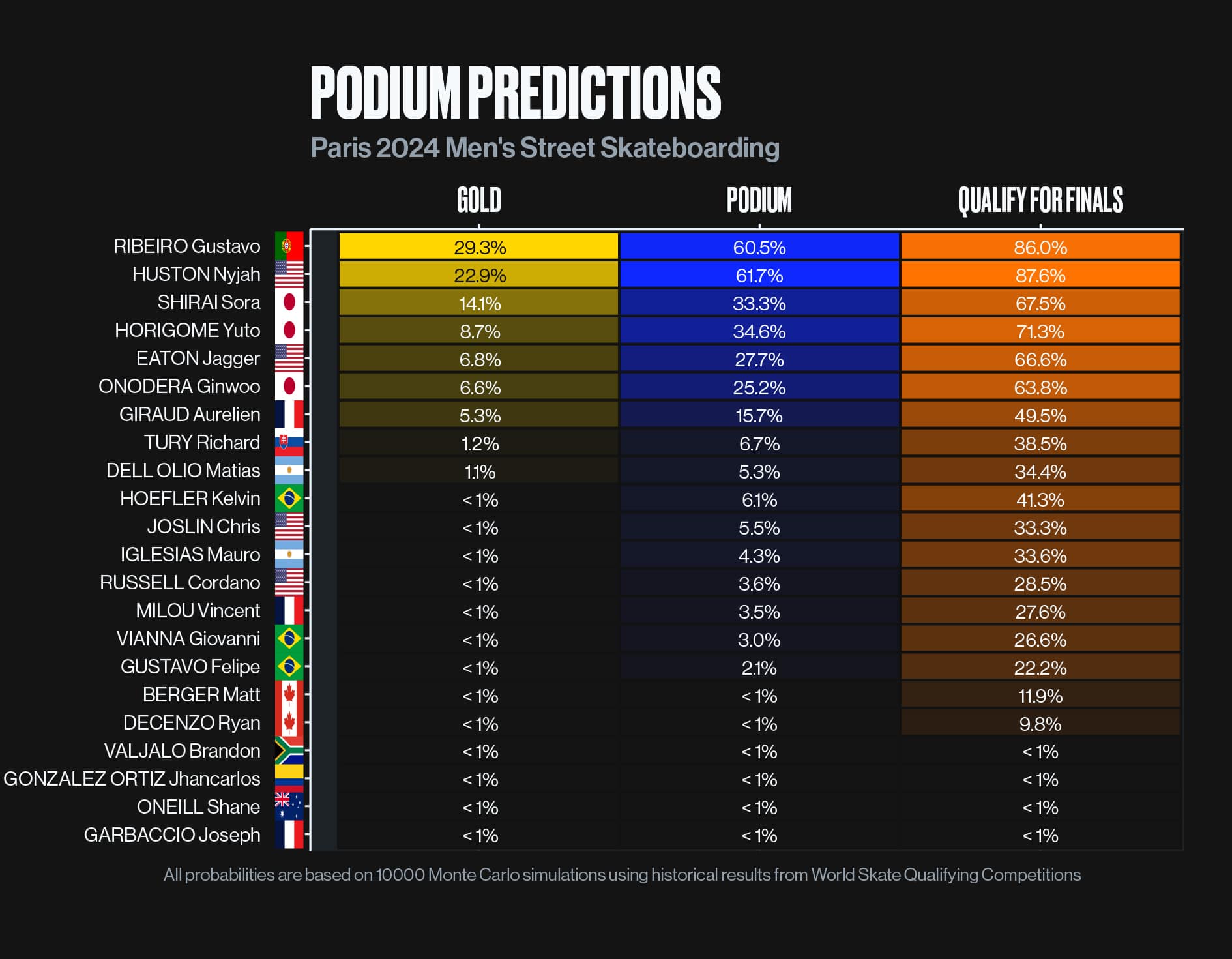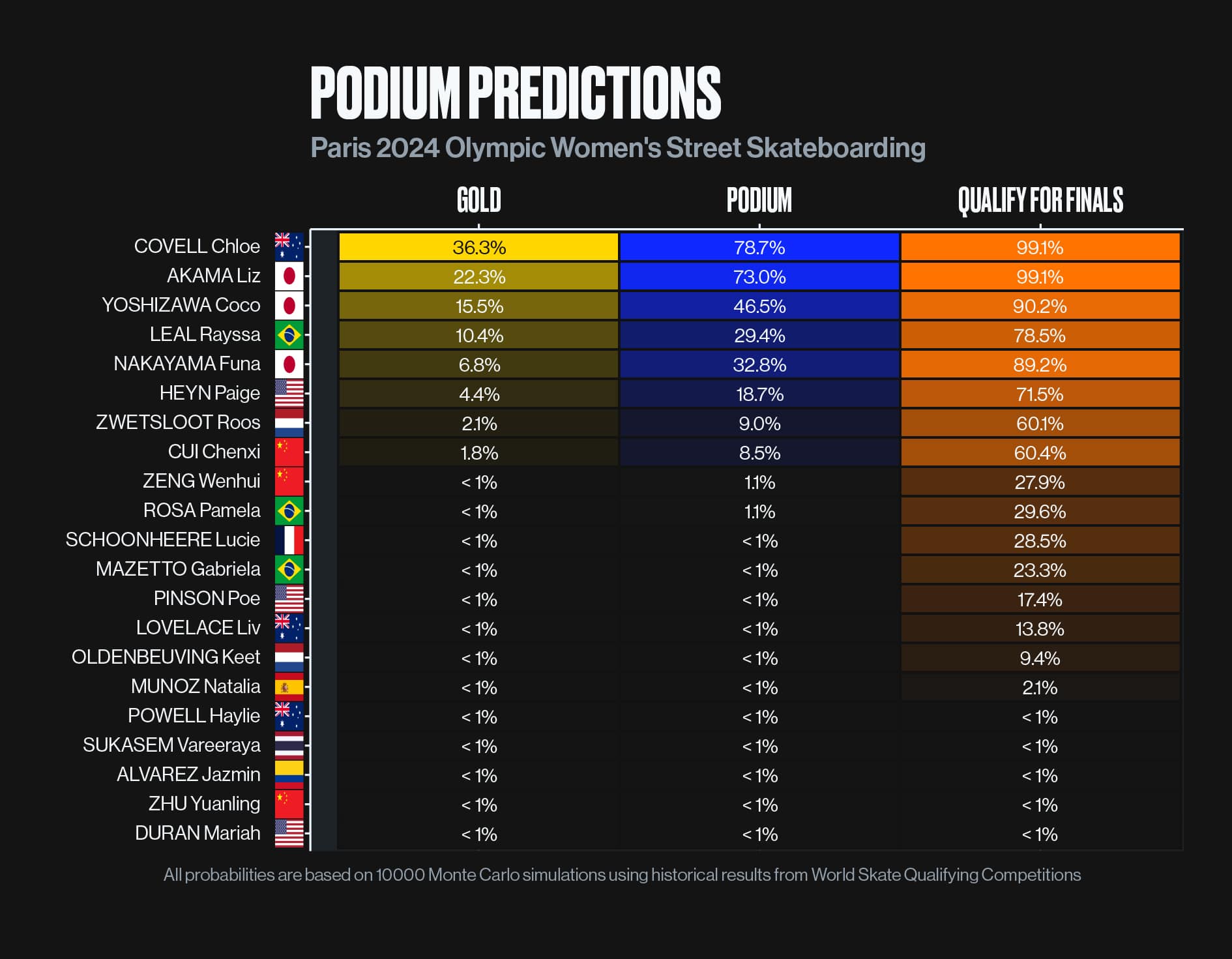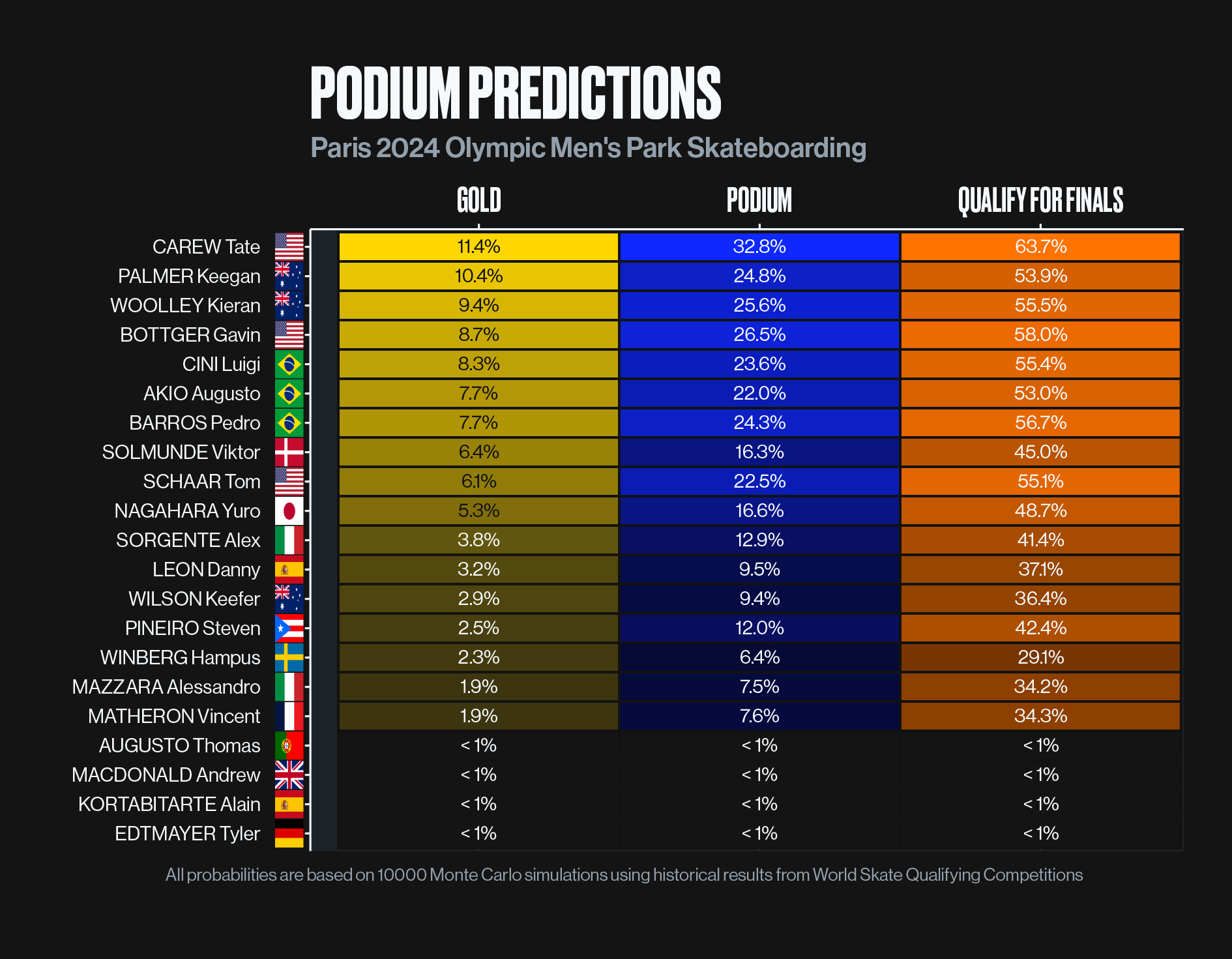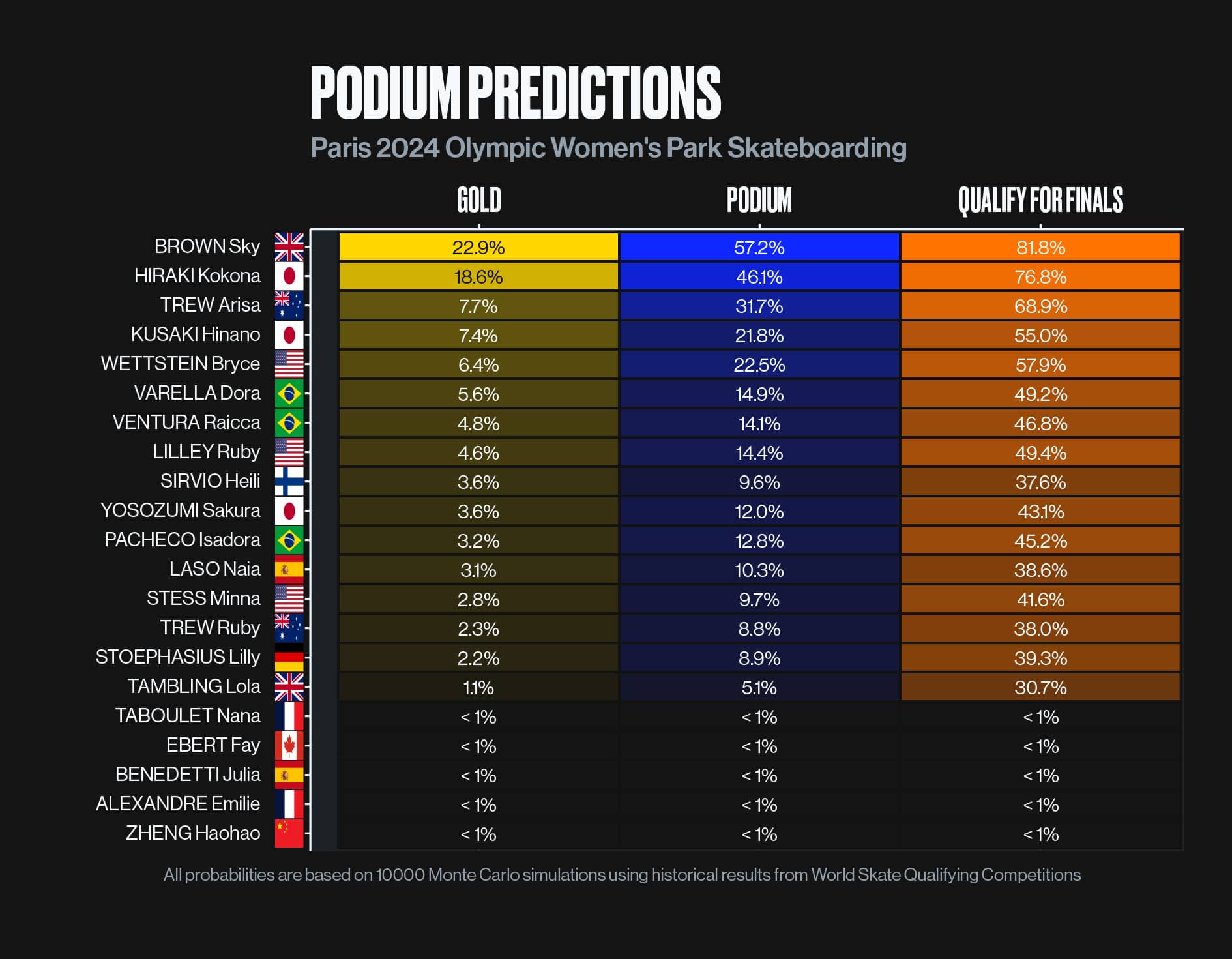Originally Posted July 26, 2024, Updated August 21, 2024.
Following the Olympic Games, the end of this blog was updated to compare the actual results to our original predictions of skateboarding success. Read on to see the methodology employed and if we got it right.
YES, SKATEBOARDING IS AN OLYMPIC SPORT
Street and park skateboarding debuted at the Tokyo 2020 Games and have already been approved for Paris 2024 and LA 2028. With the Paris 2024 Olympics only a week away, our data science team here at Kitman wanted to see how we could use data and our expertise to explore these new freestyle sports in a fashion never really done before!
Now, the last thing we want to do is turn skateboarding into skateBORING! So, what does any good data scientist do first? Predictions! We set out to see if we could predict the outcome of the Men’s and Women’s Street and Park competitions based on the qualifying competitions leading into Paris 2024. Before we roll on to the big finish, first, a little background on how competitive skateboarding works.
Skateboarding 101
Olympic skateboarding has two disciplines: “street” and “park”. Park is like “bowl” (pool) skating. Think California in the ’70s (Dogtown and Z-boys). In park competitions, skaters perform 45-second runs in which they link a sequence of coping (rail) and aerial tricks together in a hollowed-out concrete bowl (filled with ramps, bumps, quarterpipes). On the other hand, street skating is what most people think of as “skateboarding.” Imagine skaters in the “streets”,, jumping down stairs, grinding on handrails, ledge, etc. Street skaters also perform runs in competition, linking sequences of tricks around a skatepark designed to emulate an urban environment. While park skaters use their speed and power to propel themselves into the air, street skaters use ollies to pop off the ground quickly onto obstacles. Also in street competitions, skaters perform single, isolated tricks on a single obstacle in the park, called best-tricks. As the disciplines differ quite a bit, very few skaters at the elite level compete in both disciplines.
The Olympics Competition Formats
In Paris, 22 men’s and women’s street and park skaters have qualified and will compete across two rounds: semi-finals and finals. The top 8 from the 4 heats of 5-6 skaters will advance to the single heat finals. Each round at the Olympics, semi-finals and finals, is split into phases depending on the discipline. In street, athletes perform two 45-second runs followed by five best-trick attempts, with both runs and tricks judged on a scale from 0.00 to 100.00. If an athlete bails during a best-trick attempt in street skateboarding, they receive a 0.00 for that trick, while multiple bails in a run are judged accordingly. The highest run score and the top two best-trick scores are combined for a total round score out of 300. In park skateboarding, athletes perform three runs, with the best score taken as their final score. If a park skater bails a trick, that run is terminated. Scores rank skaters within each round, with judges using guidelines (World Skate Judging Criteria) to form an overall impression of each performance.
The WHY
Competitive skateboarding is a complex sport. Olympic skateboarding is so new that we actually don’t know very much at all about performance, especially regarding how and why judges make their decisions. Unlike gymnastics or diving, where there are specific point deductions and awards for various performance factors, skateboarding judging is completely subjective. By design, there is no standard point value for a skater’s flow or individual style. So, how can we predict the outcome of a skateboarding competition at the Olympics if we don’t objectively understand performance just yet? The answer lies in analyzing past performances of skaters from all the preceding qualifying competitions. By leveraging this data, we aim to uncover patterns and insights that can help us make informed predictions about who might grab Gold.
The HOW
We simulated 10,000 competition semi-finals and finals to calculate skaters’ probabilities of advancing to finals, and winning medals. In each simulation, we generated run (and best-trick) scores based on each athlete’s past performances. For street best-tricks, we first calculated the probability of the skater landing or bailing that trick, and then if landed, generated a score. To align with World Skate judging, where scores are used as a means to rank skaters performances against one another in that round (scores don’t really matter), we standardised all past run and best-trick scores to represent rank order. The top 8 skaters advanced to the finals (street: 1 run + 2 best-tricks, park: best run of 3) , where another round of simulated scores predicted the podium outcomes.
The PREDICTIONS
Street – Men

Japan and United States are favored to win gold. Japanese Tokyo 2020 gold medalist Yuto Horigome (World Skate #3), Sora Shirai (World Skate #2), and Ginwoo Onodera (World Skate #1) all showing a combined 29.4% chance of taking the top spot. Individually, Portuguese skater Gustavo Ribeiro (World Skate #7) has the highest chance of winning gold, given his impressive consistency and high scores in qualifiers. Interestingly, our model shows current #1 ranked Ginwoo Onodera has only a 6.6% chance of winning gold. He finished 2nd in both 2024 qualifier series competitions (Shanghai and Budapest), but of all the Olympic skaters, his max run score ranks 9th highest, and highest best-trick ranks 7th, overall. So does he have the ability to “wow” the judges in those moments that matter, to stand out in their eyes and set him apart from the competition?
He is also 14 and competing in his first Olympics. Will experience play a factor? Despite a lower model prediction of 8.7%, Yuto Horigome continues to be a likely favorite for gold, fresh off the back of an impressive win in Budapest qualifiers.
Our model shows the Americans a combined 29.7% chance at gold. American street and park skater, Jagger Eaton (World Skate #4), competed in both at the last olympics, and won bronze in street. This time, he’s focusing solely on street competition. Fatigue is a significant factor in skateboarding, with landing forces on concrete exceeding 10 times body weight. With both the semi-finals and finals on the same day, the challenge is even greater. While he may not consistently outperform Yuto, Nyjah, and Gustavo, if Jagger can nail a few high-scoring best-tricks and avoid any bailouts in his run, this American underdog has a shot at the podium again, perhaps even taking home a gold medal.
Street – Women

Our model shows Australian Chloe Covell (World Skate # 6) with greatest chances at gold. Though, just like in Men’s street, there is good chance for an all japanese podium; Liz Akama (World Skate #2), Coco Yoshizawa (World Skate #1), and Tokyo bronze medalist, Funa Nakayama (World Skate #4). Tokyo Silver medalist Rayssa Leal (World Skate #3) also shows a good chance back at the podium. Our model shows her with a 10.4% chance at gold, although this is after not competing in Budapest, as she already qualified for the Olympics. Does she have some new tricks she has been holding back to wow the judges in an effort to get Gold this time around in Paris?
Park – Men

Men’s park does not appear as clear cut as the street. The format (best run of 3) favors high risk, high reward athletes, meaning bails will happen in other runs. Our simulation includes those bailed runs (with associated low scores), and as such, tends to award those more “consistent” skaters. There are many possible podium contenders; which really has been the case across all the qualifiers. Our model shows American, Tate Crew (World Skate #1), has the highest chance of winning gold (11.4%), albeit only slightly. Australian Tokyo gold medalist Keegan Palmer (World Skate #2) is a likely pick for a repeat gold in Paris. He is also on a hot streak, coming off the back of a win (Budapest 2024) and 2nd (Shangahi 2024) in the most recent qualifiers. Don’t forget his teammate, Kieran Woolley (World Skate #7), who consistently is finishing in the top 5 of qualifying competitions (and finished 5th in the Tokyo games). Experience could help Tokyo silver medalist, Brazilian Pedro Barros (World Skate #9), back to the podium.
Park – Women

Our model really highlights the wide talent pool in the women’s park competition. It is revealing Great Britain’s Sky Brown (World Skate #4) (Tokyo Bronze Medalist) with the greatest chances of Gold, likely due to results from earlier qualifying competitions. Recently returning from a knee injury, she missed the qualifier event in Shanghai, but returned on a high with a 2nd place finish in Budapest leading into Paris. No surprises that Japan’s Kokona Hiraki (World Skate #1) is a likely gold pick as well, finishing in the top 5 of all qualifying events. However, coming off of a hot streak of two 1st place finishes at both Shanghai and Budapest qualifiers, our model agrees that Arisa Trew (World Skate #2) is also a favorite to win Gold in Paris! Will defending gold medalist, Sakura Yosozumi (World Skate #3) fall off the podium?
The FINAL VERDICT
Although predictions can offer a lot of insight into performance, they don’t tell the whole story. Integrating data with expertise, here are our predictions for Olympic Skateboarding!
| Street – Men
Gold: 🇯🇵 Yuto Horigome Silver = 🇵🇹 Gustavo Ribeiro Bronze = 🇺🇸 Nyjah Huston |
Street – Women
Gold: 🇧🇷 Rayssa Leal Silver: 🇦🇺 Chloe Covell Bronze: 🇯🇵 Liz Akama |
|
| Park – Men
Gold: 🇦🇺 Keegan Palmer Silver: 🇺🇸 Tate Crew Bronze: 🇦🇺 Kieran Woolley |
Park – Women
Gold: 🇦🇺 Arisa Tew Silver: 🇯🇵 Kokona Hiraki Bronze: 🇬🇧 Sky Brown |
UPDATE: The Verdict vs. the Reality
So how did we do? See how our predictions compared to the final results.
| OUR VERDICT | REALITY |
| Street – Men
Gold: 🇯🇵 Yuto Horigome Silver: 🇵🇹 Gustavo Ribeiro Bronze: 🇺🇸 Nyjah Huston |
Street – Men
Gold: 🇯🇵 Yuto Horigome Silver: 🇺🇸 Jagger Eaton Bronze: 🇺🇸 Nyjah Huston |
| Street – Women
Gold: 🇧🇷 Rayssa Leal Silver: 🇦🇺 Chloe Covell Bronze: 🇯🇵 Liz Akama |
Street – Women
Gold: 🇯🇵 Coco Yoshizawa Silver: 🇯🇵 Liz Akama Bronze: 🇧🇷 Rayssa Leal |
| Park – Men
Gold: 🇦🇺 Keegan Palmer Silver: 🇺🇸 Tate Crew Bronze: 🇦🇺 Kieran Woolley |
Park – Men
Gold: 🇦🇺 Keegan Palmer Silver: 🇺🇸 Tom Schaar Bronze: 🇧🇷 Augusto Akio |
| Park – Women
Gold: 🇦🇺 Arisa Trew Silver: 🇯🇵 Kokona Hiraki Bronze: 🇬🇧 Sky Brown |
Park – Women
Gold: 🇦🇺 Arisa Trew Silver: 🇯🇵 Kokona Hiraki Bronze: 🇬🇧 Sky Brown |




